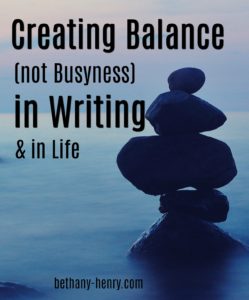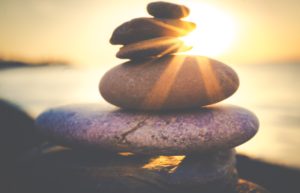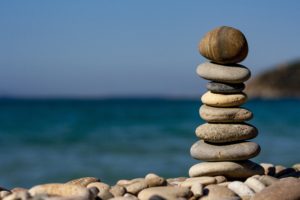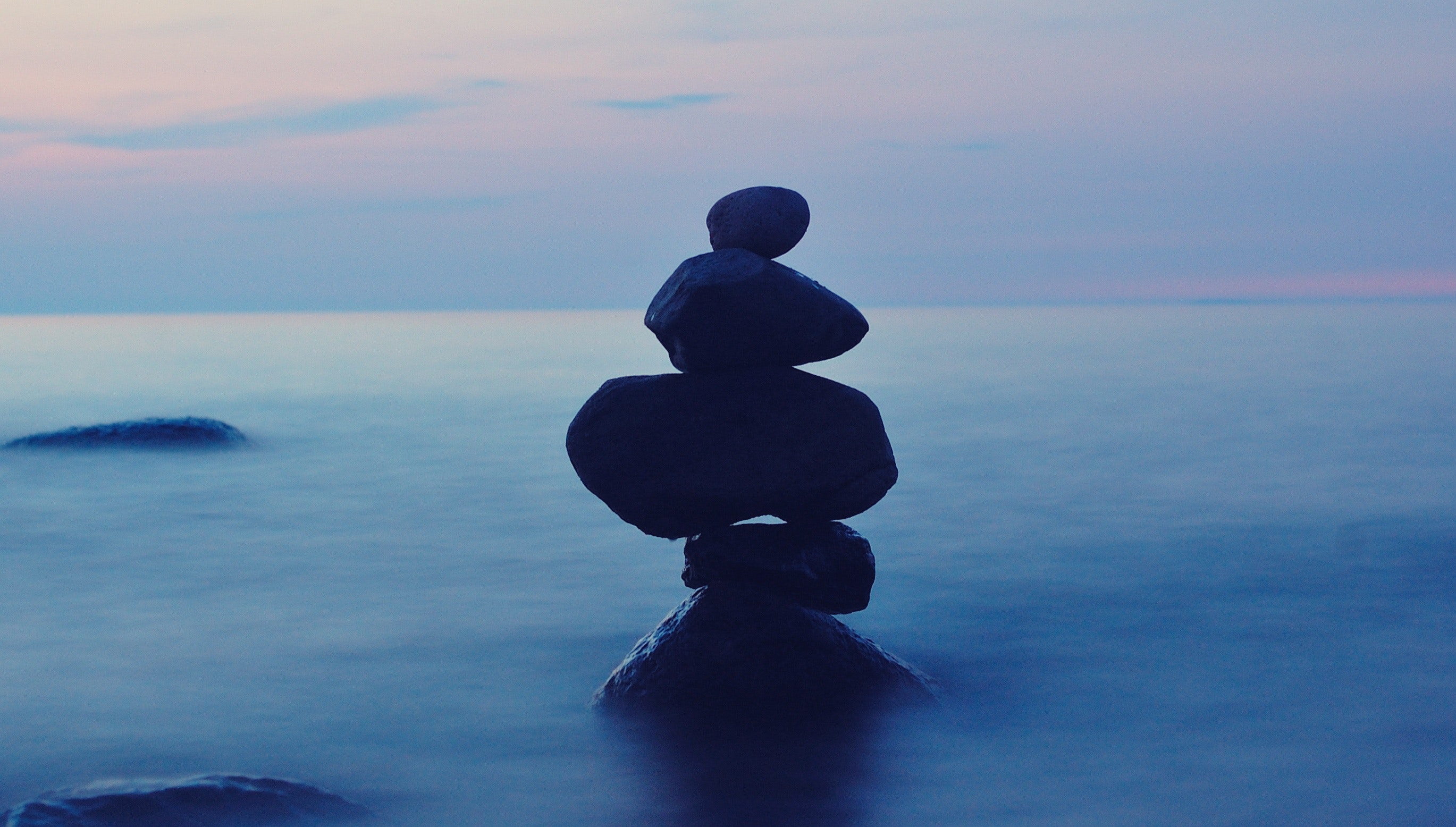It’s too easy to be busy.
We have meetings, commutes, chores, errands, classes, and bills to pay. We have families and coffee dates. And somewhere in there we should probably shower, eat, and sleep.
Now these aren’t bad things. In fact, they’re important and good. (Please don’t give up showering! 😉 )
The problem is that sometimes we get caught up in our activities. We go go go until we forget what it’s like to slow down.
Our lives are filled with busyness.
Sometimes we forget that being busy is not the goal.
Busyness is not inherently good. It does not make us more important. It doesn’t even always make us more productive.
Being busy should not be our identity.
Ever feel proud of being busy? Brag about how tired you are or how many meetings you have scheduled in one day? I’ve totally done that.
There’s something in us that says we must be important if we’re busy. We must be getting things done and taking names. Out time must be in high demand.
What happened to working smarter not harder? To working hard and then taking a break?
Sometimes I feel guilty for taking breaks.
Reports show that in the U.S. over half of employees don’t use all of their vacation time, with over 658 million vacation days being lost at the end of the year.
It sounds like I’m not the only one who finds it hard to take a break.
I say this site is a place for busy writers. And it is. (And I am one!) But instead of being identified by our busyness, hopefully we can be working to overcome it.
We want to be moving forward from busy to balanced.

Busy is when we make our life fit into our schedule.
Balanced is when we make our schedule fit into our life.
There’s nothing wrong with schedules. Doing lots and lots of activities can be fun. There can be a certain rush in going from thing to thing to thing.
However.
We want to be careful this does not become our identity or our habit. We don’t want to be addicted to our schedule books or exhausted by over-committing.
Instead of being always busy, we want to strike a balance between work and play, between activities and rest.

3 Tips for Creating Balance
1. Remember that Life has no Timeline
Sometimes we think we need to achieve certain benchmarks by certain deadlines. We’re told to attend college, get married, settle in a career, excel in said career, buy a house, have children, etc etc etc. And that’s just the beginning!
I don’t know about you, but it’s exhausting to think about all the things people expect of us and that we expect of ourselves.
Now, it’s not bad to have dreams and things we want to achieve. I think dreams and goals are awesome.
But we want to think for ourselves: What is it that we want our lives to look like. What is our ideal. What does our timeline look like.
These days it’s more possible than ever to attend school at any age, and it’s also very possible to achieve a great career without a degree. Maybe you want to travel instead of buying a house or you’re working at a less prestigious job so you have more time for your family. All of these are legit and great options.
Everyone doesn’t need to follow the same path in the same way.
Once we let go of some of these expectations, we can be free to identify what we actually want to focus on. What do we want to achieve? Or just what do we want to do next? We don’t need to have it all figured out.
Letting go of perceived deadlines can allow us to travel at our own pace toward our own goals. What are we in a hurry for, after all?
While we don’t want to be stagnant or lazy, there’s no need to be overwhelmed with activities or rushing forward for no reason.
2. Remember to Keep Priorities in Mind
Having priorities helps us limit what we want to focus on. Once we identify what’s important to us, we often find things we’re doing that we don’t really care about.
These are things we can let go.
This frequently comes down to setting boundaries. We can decline the invitation to that activity we really don’t care about. Maybe it’s time to step back from certain commitments or people that are negative or stressful.
Saying no to things does not make us bad people. Setting healthy boundaries is a way of showing our respect for ourselves and practicing self care.
By focusing on our priorities and trimming back on other activities it can free up both our energy and time for what is important.
3. Remember to Practice Self Care
Balance is all about self care.
Sometimes I feel selfish for taking time for myself or saying no to activities. There are times my own needs are at the bottom of the To Do list and they never get done. And you know what? Sometimes that’s okay. We all have times when we take care of others first.
However, neglecting ourselves is not sustainable. Self care doesn’t need to be selfish.
We can only properly care for others in the long run if we are also taking care of ourselves. And by demonstrating proper self care and self respect we are modeling that healthy behavior to our kids, our friends, and those around us.
Self care looks different for every one of us. Some of us want loud music and dancing, some of us want tea and a book. Some of us want different things on different days.
Find what makes you feel rested, happy, and fulfilled. Practice those things. Make them a priority and schedule them in if needed! We all need to be taking breaks and finding rest regularly.

Questions to Ask Ourselves to Evaluate Balance
- Are we physically healthy? Do we feel good about our eating, sleeping, and fitness levels?
- Are we mentally and emotionally healthy? Do we have fulfilling activities and emotional supports available? Are we getting time to recharge regularly? Do we have a friend or a professional to talk with, or both?
- Are we relationally healthy? Do we have time with the people important to us? Are these relationships healthy?
- Are we happy with where we are professionally? What about academically?
- Are we satisfied with where we are spiritually?
- Are we happy with where we are with our writing? Do we take time for this? Are we stressed by our projects?
- Do we have areas in our life we find stressful or overwhelming? What do we want to see more or less of in our lives?
If these questions make you feel like there is very little balance in your life, don’t worry! You’re not a failure and you’re definitely not alone!
We all have room for improvement, this is just to help us identify where changes can be made.
Finding balance in our lives can be a constant battle as we adjust to various changes and life in general. Busyness and stress tend to creep in on us and we need to be on our guard.
But it’s totally worth it.
When we’re living balanced lives it helps us to be more healthy and happy. Our habits are sustainable. We have energy and space to write and create. We have times of rest and fun along with our work and productivity.
These patterns will help us to be both better writers as well as better people in general.
What about you? Do you feel like you have a good balance in your life and with your writing these days? What do you need more or less of in your life today?





Great post and questions to ponder! I am an advocate for self care, and am so glad you addressed the importance of it.
Have a lovely day 💜
Thanks for your note, Wendy, and for your support of self-care! I hope you have a wonderful weekend yourself <3
All really good thoughts and reminders!
Thanks, Emilee! Hope you get a chance for both rest and writing yourself this weekend 🙂